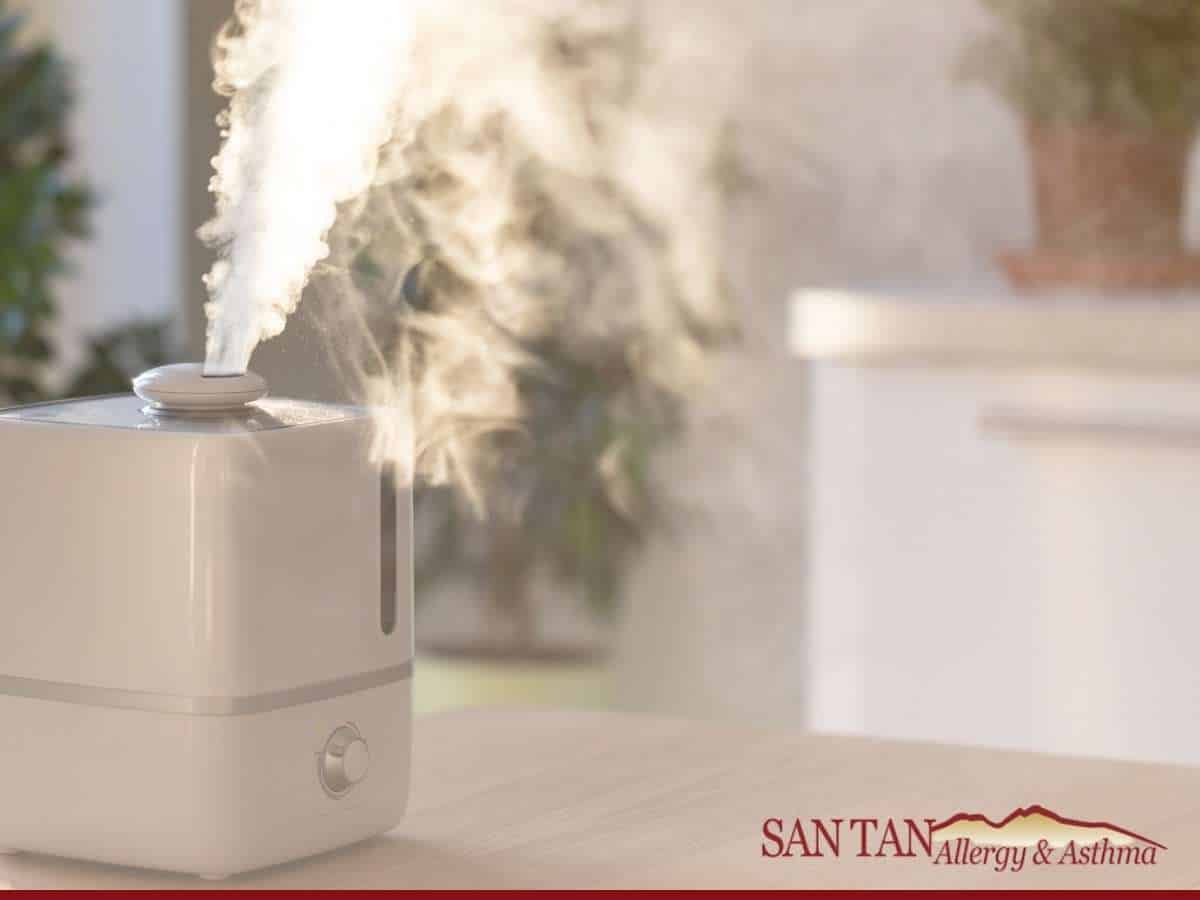Can Humidifiers Help With Asthma Symptoms?
Having asthma is not easy. A home’s high humidity level can attract dust mites and mold, triggering allergic reactions, while a low humidity level can irritate and dry your throat.
In other words, you must be careful with your environment because it may make it harder for you to breathe. Some people use humidifiers to make things easier, but is it worth it?
A Chandler allergy expert will tell us if a humidifier is necessary when suffering from asthma.

The True About Humidifiers & Asthma
Air temperature and weather conditions affect the indoor humidity level. When there’s cold weather, the air in your house may be dry. This issue can affect your lifestyle if you live in a dry climate year-round.
A humidifier can help you keep the right amount of indoor humidity. However, there’s no medical record about the benefits of humidifiers to alleviate asthma.
Moreover, you should be aware that humidifiers can worsen asthma depending on their use. These are some cautions you should notice:
- Humidifiers that run nonstop or too high can worsen asthma.
- Humidifiers can irritate your lungs if you fill them with tap water.
- They can also worsen asthma if they are not cleaned properly.
- You should not clean your humidifier with chemicals that irritate the respiratory system.
As you can see, you must be extremely cautious when using humidifiers, especially if you are an asthma patient. Humidifiers do not alleviate asthma symptoms per sé, on the contrary, they can worsen these symptoms if not used properly.
Ideal Indoor Humidity For Asthma: EPA Recommendations
Maintaining the correct humidity level indoors is essential for respiratory comfort, especially for people with asthma. According to the EPA, the ideal indoor humidity should be kept between 30% and 50%. This range helps keep the air moist enough to prevent dryness without encouraging the growth of harmful microorganisms like mold and dust mites.
When humidity drops below 30%, the air becomes too dry, which can irritate the nasal passages, throat, and lungs. This irritation may worsen asthma symptoms or increase the risk of respiratory infections. Additionally, dry air dries out the mucous membranes, making it harder for your body to trap and eliminate allergens or pollutants effectively.
Conversely, when humidity rises above 50%, it creates a favorable environment for mold spores, mildew, and dust mites to thrive, which are common asthma triggers that can worsen symptoms or cause frequent flare-ups in sensitive individuals.
Keeping humidity within the EPA’s recommended range is a key step in managing your indoor air quality and supporting respiratory health. However, always consult with an experienced allergy expert or healthcare provider to determine the best approach for your individual needs and living environment.
Humidifier Maintenance: Essential Tips For Asthma Sufferers
A humidifier is only as effective and safe as the care it receives. Without proper upkeep, it can become a breeding ground for bacteria, mold, and other irritants that may worsen asthma symptoms instead of providing relief. This makes regular maintenance essential, especially for those with respiratory conditions.
To ensure your humidifier remains a helpful tool, follow these important steps:
- Empty and dry the tank daily to prevent the buildup of bacteria and mold. Standing water is a perfect environment for harmful microorganisms to multiply.
- Use distilled or demineralized water rather than tap water. This reduces the chance of minerals and contaminants being released into the air, which can irritate the lungs and worsen asthma.
- Clean the tank thoroughly every 3 days using natural cleaning agents like white vinegar or hydrogen peroxide. Avoid harsh chemical cleaners that may leave harmful residues or fumes.
- Replace filters regularly and always adhere to the manufacturer’s guidelines for filter care. Dirty or clogged filters reduce the device’s effectiveness and can circulate allergens.
- Never let water sit unused in the tank for long periods. Stagnant water is a common source of mold spores and bacteria, which can contaminate the air and trigger asthma attacks.
In short, maintaining cleanliness and following a consistent cleaning schedule are vital. Even the most advanced humidifier can pose risks if neglected, so attentive care is key to protecting your respiratory health.
Dehumidifiers & Asthma: Are They The Right Choice?
Humidity can occur in any type of weather. Breathing humid air can cause respiratory issues and worsen asthma.
Queen Creek allergists recommend staying alert to humidity and dampness because both factors can attract mold and other allergens in the environment. These allergens can affect the respiratory system and worsen most asthma symptoms.
In extremely humid environments, dehumidifiers can help. These electrical items remove water from the air, bringing the humidity down in an overly humid space. They reduce the buildup of mold and dust mites too.
If you have mold in your house, a dehumidifier won’t remove it, but it will reduce additional mold growth.
Dehumidifiers are a great option for overly humid environments.
Humidifiers vs. Dehumidifiers: Which Is Best For Asthma Relief?
There’s not a concrete answer about the best option for asthma. A humidifier or a dehumidifier does not necessarily have to be the best alternative to take care of asthma symptoms. The final choice will depend on the specific individual situation and the triggers. Therefore, you may not even need any of these appliances.
If your house becomes too dry in some seasons, like winter, a humidifier can help by adding humidity to the air. It can help you breathe better too, but you must take care of this item if you don’t want to worsen your asthma symptoms. You can also ask your Mesa asthma doctor if a humidifier is necessary in your case.
If you live in a damp environment, a dehumidifier may be better because it traps water from the air, making it more comfortable to breathe. But, once again, you must also take care of this item and use it properly.
You should also consider your health status. Reaching for a humidifier when you have a cold or respiratory issue is not always the smartest decision. A humidifier will not help break up congestion, so you should not rush the decision.
A humidifier can make it easier for you to breathe in some cases, but it can also worsen your respiratory infection if you have asthma or an allergy to mold.
The best you can do before buying a humidifier is to analyze your environment and ask a doctor.
Top Asthma Management Tips For Better Breathing
If you are an asthma patient, you may be already taking rescue medications. However, you should also follow these tips to manage the asthma symptoms better:
- Identify your asthma triggers to avoid them.
- Don’t smoke.
- Avoid secondhand smoke.
- Obtain your flu shot annually.
- Wash your hands often.
- Exercise often.
- Eat nutritious food.
- Get enough sleep (at least 7-8 hours).
Contact Trusted Mesa Allergy Doctors
If you or a loved one is struggling with asthma symptoms—especially in a dry or dusty environment—it’s important to take proactive steps at home. Using tools like humidifiers, monitoring air quality, and staying on top of medical care from experienced allergy doctors can make a big difference. Simple adjustments to your living space and daily routine may help ease discomfort and improve your breathing.
While it’s difficult to control the weather, you can reduce your exposure to asthma triggers. But, if you still have issues with your asthma, you should see your doctor. At San Tan Allergy & Asthma we will be proud to help you! We are Arizona’s top-rated allergy and asthma clinic, so our doctors are well-equipped to help manage patients with a variety of immune deficiencies. Contact us now for more information about our services!
FAQs
- Can a humidifier help with asthma symptoms?
It depends on your environment and the cause of your symptoms. In dry climates or during winter, a humidifier can ease throat dryness, nasal irritation, and make breathing feel more comfortable. However, it doesn’t work for everyone, and too much humidity can have the opposite effect. Be sure to ask your asthma doctor if it’s right for you.
- Can a humidifier make asthma worse?
Yes. If not properly maintained, a humidifier can harbor mold, bacteria, or mineral particles that get released into the air and irritate the lungs. Using hard tap water or running it too often can make symptoms worse instead of better.
- How often should I clean my humidifier?
Ideally, every 1–3 days. Daily rinsing and regular deep cleaning help prevent the buildup of bacteria, mold, or mineral deposits. Always follow the manufacturer’s instructions to keep it safe and effective for daily use.
- Do people living in Arizona need a humidifier?
Many do benefit from using one, especially during the dry winter months when indoor air can become uncomfortably dry. However, it’s not always necessary. Monitoring your home’s humidity levels can help you decide whether one is right for your space.
- Will a humidifier kill mold or remove allergens from the air?
No, humidifiers are not designed to eliminate mold or allergens. In fact, if not cleaned regularly, they can spread airborne irritants and worsen indoor air quality, especially for those with allergies or asthma.
- Is a humidifier better than a dehumidifier for asthma?
It depends on your specific environment. A humidifier helps when the air is too dry, while a dehumidifier is better in damp conditions where mold and dust mites thrive. Your choice should match the humidity levels in your home and your personal triggers.
- Should I talk to a doctor before using a humidifier for asthma?
Yes. Your asthma doctor can help determine whether it’s a helpful addition to your asthma management plan or if it might pose risks. Personalized advice is especially important for people with severe or persistent symptoms.

San Tan Allergy & Asthma
4915 E Baseline Rd #112
Gilbert, AZ 85234
Phone: 480-626-6600
Email: officemanager@santanallergy.com
Website: https://santanallergy.com/







